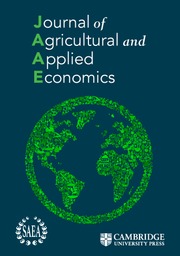Article contents
Relevance of Policy Analysis: Needs for Design, Implementation and Packaging
Published online by Cambridge University Press: 28 April 2015
Abstract
This article challenges the traditional model of the economist as a humble technocrat who simply provides analysis given the preferences of policy decision-makers. Since decision-makers rarely reveal their preferences, it is important that the would-be policy research/analyst know the political economy and be willing to identify potential performance goals for society. Researchers who are willing to incur the transaction cost associated with becoming involved in useful policy research must learn to work within the imperfect policy process. Policy research that considers the importance of implementation and that acknowledges the institutions and the history will have the highest chance of being useful to policy-makers.
- Type
- Invited Papers and Discussions
- Information
- Copyright
- Copyright © Southern Agricultural Economics Association 1994
References
- 1
- Cited by


